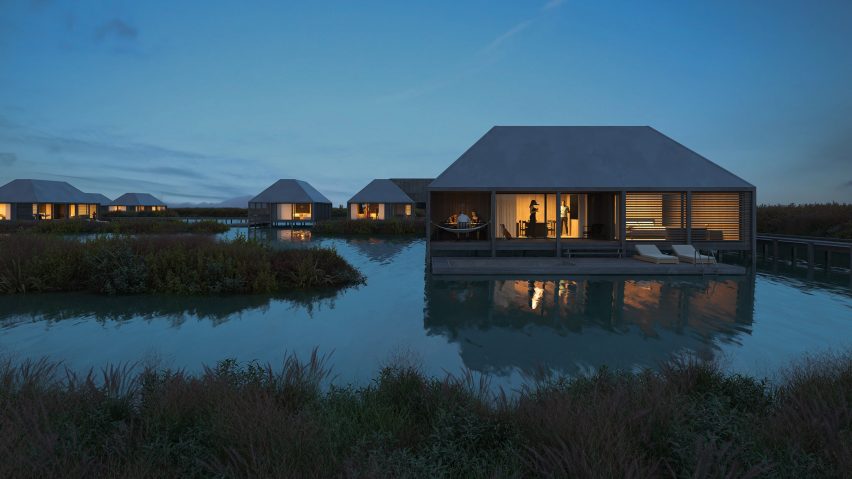Danish maritime architecture studio MAST has revealed plans to build a hotel formed of houses on stilts in a Portuguese lagoon formerly used for salt production.
Located on the Sado Estuary near Setúbal, the overgrown salina will be transformed into an eco-conscious tourist destination that takes cues from the traditional fisherman's huts and jetties common to lagoons and rivers in the south of Portugal.
Construction is expected to begin imminently, with the first houses scheduled to open to guests in late 2025.
The project also involves turning a large section of the 50-hectare site into a nature reserve.
Marshall Blecher, architect and co-founder of MAST, said the ambition is to promote sustainable tourism.
"The project adds much-needed accommodation to the area while having the lightest possible touch on the unique landscape," he said.
MAST's masterplan proposes more than 50 stilted houses on the water. These are to be prefabricated off-site using Portuguese cross-laminated timber (CLT).
According to Blecher, this will reduce the impact on the "delicate landscape".
The lagoon is filled with halophytic plants such as saltbush and an abundance of brine shrimp that attracts flocks of flamingos and oystercatchers.
"The landscape is extremely unique and naturally beautiful," said the architect. "We saw an opportunity to create a new typology of accommodation for the area without significantly impacting the site."
These houses will be accessible via a network of elevated bridges that link up with local nature trails, or directly via boat or kayak.
Elsewhere on the site, an old building previously used for salt production will be overhauled to create a restaurant and spa, while a birdwatching tower will offer views across the wetlands and seafront.
The real-estate developer – who wishes to remain anonymous at this stage – also plans to bring small-scale salt production back to the site.
A cluster of new buildings based on traditional salt storage warehouses will provide facilities for producing "small batches of artisanal salt" in a process that involves channelling and evaporating saltwater.
Blecher, who also runs the architecture office Studio Marshall Blecher, co-founded MAST in partnership with maritime designer Magnus Maarbjerg.
The studio specialises in designing buildings for water. In 2022 it unveiled a flat-pack concept for floating homes, while last year it released plans for a floating park in an abandoned Italian sand quarry.
MAST was approached to explore options for the Sado Estuary site in early 2023.
The initial brief called for floating buildings, but Blecher and Maarbjerg instead proposed stilted buildings as they were considered more appropriate for the sensitive location.
"Floating buildings were not suitable in the shallow waters without dredging," Blecher explained.
Visualisations are by Slimstudio.

